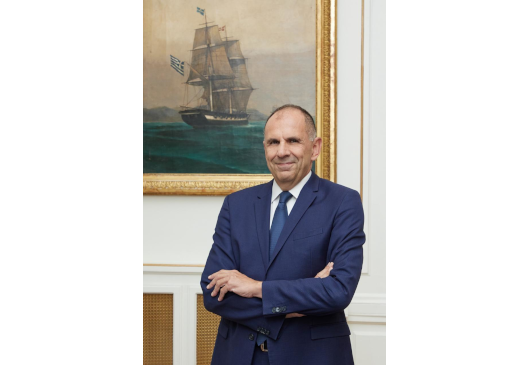 JOURNALIST: How will the new balance of political forces in the European Parliament affect the European Union's foreign policy?
JOURNALIST: How will the new balance of political forces in the European Parliament affect the European Union's foreign policy?
G. GERAPETRITIS: The recent European Parliament elections bolstered the European People's Party, which represents the European center-right and counts New Democracy among its members, as well as Eurosceptics and the far right. Conversely, the liberals of the Renew group and the Greens suffered significant losses. However, we should await the formation of the parliamentary groups, considering that a significant proportion of seats is held by newly-elected MPs associated with non-affiliated political formations. The establishment of the new European Parliament will take place on July 16-19.
The relative rise of anti-systemic forces in Europe could be attributed to the inability of European politics to address everyday issues and concerns of citizens for their future, such as the cost of living, competitiveness, agricultural development, and migration. Nevertheless, I believe that the far right does not pose an immediate threat to the cohesion and prospects of Europe. The current balance of political forces indicates that the majority of the European Parliament still consists of pro-European forces from the center-right, center, and center-left. This enables the necessary negotiations for the selection of individuals for senior posts within the Union's institutions, who will be able to gain the confidence of the Parliament. Most importantly, this balance does not threaten the common foreign and security policies, as well as the European integration process, given that the major political groups agree on the fundamentals concerning the Union's course.
The need for continuity in the Union's foreign policy also stems from the broader geopolitical environment, with two wars raging in our region. The dynamically evolving transformation of Europe into a geopolitical Union entails consistent policy implementation to ensure Europe remains a strong active force in the face of direct challenges.
JOURNALIST: Are the conditions ripe for the establishment of a Defense portfolio and a new Defense Commissioner?
G. GERAPETRITIS: The positive reception of the initiative by the Prime Minister, together with his Polish counterpart Donald Tusk, for a common European air defense funded by community funds, creates new dynamics. This proposal covers the Union's protection from hostile aircrafts, missiles, and drones, serving both as a means of operational security, as well as a strong demonstration of the Union's resolve to defend itself. Additionally, this approach strengthens the European defense industry and shifts a significant part of the financial burden, which is currently shouldered by member states on Europe's borders, such as Greece. In this context, the establishment of a new position to centralize duties for defense matters will be discussed with the newly-appointed Commission President, who, by virtue of the treaties, possesses the exclusive competence to designate the Commissioners' portfolios.
JOURNALIST: The Minority “Equality, Peace, and Friendship Party” (KIEF) came first in the elections in Xanthi and Rhodope. What does this signify? Ankara conducted an unprecedented campaign to support it. How will this affect Greek-Turkish relations?
G. GERAPETRITIS: In Rhodope, the Equality, Peace, and Friendship Party fell short in both the absolute number of votes, as well as the percentage of votes compared to the European elections of 2014 and 2019. In Xanthi, it received fewer votes than in 2014 and 2019 but a slightly higher percentage. Therefore, there is no substantial change over time. Greece is a mature democracy with a high level of rule of law and political rights. The principles of equality and equal treatment of all Greek citizens, including members of the Muslim minority, are fully guaranteed in our legal system and are reflected in practice through inclusive policies and decisions. For this reason, inter alia, the New Democracy party included a candidate from the Muslim minority in its European electoral list. It was the only one of the three major parties to do so.
JOURNALIST: In a few days, we have the NATO summit with the participation of North Macedonia. At the same time, the European accession process of the neighboring country is ongoing. Is the veto right still on the table, given that the new leadership in the neighboring country continues to challenge the Prespa Agreement?
G. GERAPETRITIS: The strict adherence to international treaties is a fundamental principle of International Law and an obvious obligation for participation in international organizations. The Prespa Agreement constitutes an international treaty that has been ratified by law, absolutely binding the two parties erga omnes, and cannot be unilaterally modified. Particularly for North Macedonia, the main provisions of the Agreement were incorporated in the Constitution of the neighboring country and were set as a condition for joining NATO. As I had the opportunity to emphasize in my intervention at the South-East European Cooperation Process (SEECP) Summit in Skopje, abstention from unilateral actions and divisive rhetoric, the faithful adoption of the European acquis, the recognition of the supremacy of International Law, and the full implementation of international agreements are of essential importance for ensuring stability, security, and prosperity in our region and the integration of candidate countries into the European family. Concessions on fundamental principles are not acceptable.
June 15, 2024


